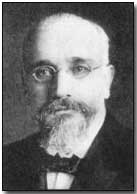Who's Who - Eleutherios Venizelos
 Eleutherios Venizelos (1864-1936) is
generally regarded as the greatest Greek statesman of modern times.
Eleutherios Venizelos (1864-1936) is
generally regarded as the greatest Greek statesman of modern times.
The first half of Venizelos' life and career was spent in Crete, where he was born on 23 August 1864.
After studying law in Athens Venizelos became leader of the Liberal Party in Crete where, in 1896, he played a prominent role in the Cretan independence movement against Turkish rule. Nine years later, in 1905, Venizelos succeeded in becoming Crete's first independent Prime Minister. Crete's union with Greece was later formalised in 1913.
In 1909 he moved to Athens at the invitation of royalist army officers (the Military League) who sought political reform, becoming Prime Minister of Greece the following year on a wave of popular enthusiasm.
The early years of Venizelos' first ministry saw revisions to the constitution (1911), military and financial reforms, and Greek participation in the Balkan Wars of 1912-13, which saw Greece's population more than double, with a similar growth in land mass.
At this stage Venizelos' relations with Greek King Constantine were warm, but were to rapidly deteriorate with the onset of war in August 1914.
Despite an official Greek stance of neutrality at the start of the First World War, Venizelos' favoured an alliance with Britain, France and Russia against Germany and Austria-Hungary. This stance was as much based upon an assessment of Allied domination of the Mediterranean as a consideration of Greek interests; however, King Constantine, a brother-in-law of Germany's Kaiser Wilhelm II, opposed co-operation with the Allies.
Venizelos came out strongly in favour of providing military assistance to the Allies during the disastrous Dardanelles campaign; however, continued disagreement with Constantine resulted in Venizelos' resignation in March 1915.
Subsequently re-elected by a landslide in the June 1915 general election - a result belatedly confirmed by the King two months later - Venizelos once back in office ordered mobilisation of the Greek army, simultaneously requesting Allied assistance in the defence of Serbia.
However by the time Allied forces reached Salonika the King had decided to dismiss Venizelos from office (ostensibly for endangering Greece's policy of neutrality) and placed in his stead a succession of puppet premiers.
Settling back in Crete from September 1916, Venizelos became the focus for anti-monarchist sentiment. The following month he established a provisional revolutionary government based in Thessalonica that gained recognition from the Allied governments.
In November 1916 skirmishes broke out between government forces and those established by Venizelos (funded by the Allies). With the political situation rapidly deteriorating and Venizelos preparing to march on Athens, the King finally reluctantly abdicated in June 1917.
Returned to power once again Venizelos oversaw the remainder of the Greek war effort, now that the country had at last openly declared for the Allies. Following the armistice Greece's expected territorial gains materialised, chiefly at the expense of Bulgaria and Turkey. Nevertheless, and in spite of British support, Venizelos was unsuccessful in his bid to establish Greek administration of Turkish Smyrna; the army subsequently occupied the region in 1919.
Venizelos' political popularity dwindled during 1920, resulting in his defeat at the general election of December 1920. Instead, the newly installed pro-royalist government invited King Constantine to return from exile; his restoration was brief however; Greece's disastrous defeat in the 1922 war with Turkey brought about his renewed exile.
Venizelos returned to power in 1924, and again from 1928-32 and in 1933; between 1928-32, although by now elderly, Venizelos oversaw modernisation of the country's economy and education system.
During the later years of his ministries Venizelos also made peace with Italy (1928), Yugoslavia (1929) and Turkey (1930). An increase in royalist sentiment brought about Venizelos' final resignation in 1933.
Seemingly retired from politics, Venizelos nevertheless re-emerged in 1935 in support of another anti-royalist revolt in Crete. Its failure obliged Venizelos to seek exile in France. He died there, in Paris, on 18 March 1936 at the age of 71.
Click here to hear Venizelos speak (in English, recorded in 1917) of the inevitability of the victory of the British Empire over Germany. Click here to read Venizelos' reaction to news of Allied success at the Vardar Offensive and Bulgaria's subsequent exit from the war.
In preparation for the Battle of the Somme, the British launched a seven-day artillery bombardment in which 1,500 guns fired 1.6 million rounds.
- Did you know?
